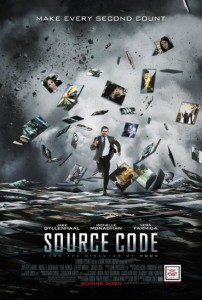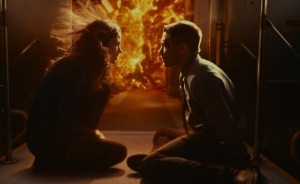In a 1999 interview for PBS’s “Nova,” quantum physicist Carl Sagan stated “If we could travel into the past, it’s mind-boggling what would be possible… The possible insights into our own past and nature and origins would be dazzling.” Playing off that idea, director Duncan Jones and writer Ben Ripley weave a complex narrative on the nature of reality and our role in it.
Colter Stevens (Jake Gyllenhaal) is an army helicopter pilot who awakens to find himself in the body of an unknown man on a train in Chicago. Quickly he discovers that he is part of a mission to find a bomber of a commuter train by reliving eight minutes of his host’s memory.
Taking a step forward from Jones’ cerebral 2009 project “Moon,” this film maintains the key points of Duncan’s success, namely tight writing and minimalist settings. There are multiple story lines occurring simultaneously and the audience is pulled along as Colter attempts to make sense of his predicament.
Others have compared “Source Code” to “Inception,” mostly due to the mind-bending storylines and the confusion caused by having to piece the story together in the style of “Memento.” But a more apt comparison would be to the first “Matrix” movie. Remember how you spent most of that first film trying to figure out what was happening to Keanu? What had he fallen into? Was he really this clueless? How much of that stony-faced cluelessness was even acting? Still, as in “The Matrix,” the plot of “Source Code” still engages and flows pushing towards the inevitable end.
The problem with having extremely tight writing is that any flaws become magnified. There are a few generic “Hollywood” moments that stick out against the seamlessness of the rest of the script. Most obvious is the general wuss-ified nature of the ultimate villain once he is met. The project head for the Source Code military program, Dr. Rutledge (Jeffrey Wright), who sends Colter back in time, is more intimidating than the villain.
The other major flaw is the prolonged conclusion that at could have ended at several points, but continued to play out the love story sub-plot. The early sections of the film balance the humanity of Gyllenhaal’s character with the extremity of the situation extremely well, but once the latter is concluded the film continues trying to resolve the former like a car on a flat tire. It never quite seems to balance out.
Most impressive is Jones’ effective building of tension. Colter returns to the exploding commuter train roughly six times, yet every single instance still has you on the edge of your seat as you wait for the inevitable explosion. Gyllenhaal shines as a likeable (and somewhat bumbling) hero doing his best to hold it together while tasked with a seemingly impossible mission. While this may not be a memorable film in the vein of “Moon,” it is certainly great fun and definitely worth the price of admission.
“See It/ Rent It/ Skip It”: See it. And while you’re at it, please donate to my campaign to send 100 copies of this script to Michael Bay so he can learn how to incorporate both explosions and writing in the same film.
THREE AND A HALF STARS out of four.
Directed by Duncan Jones. Written by Ben Ripley.
Rated PG-13 for some violence including disturbing images, and for language.
Runtime: 1 hour, 33 min





Leave a Reply
You must be logged in to post a comment.